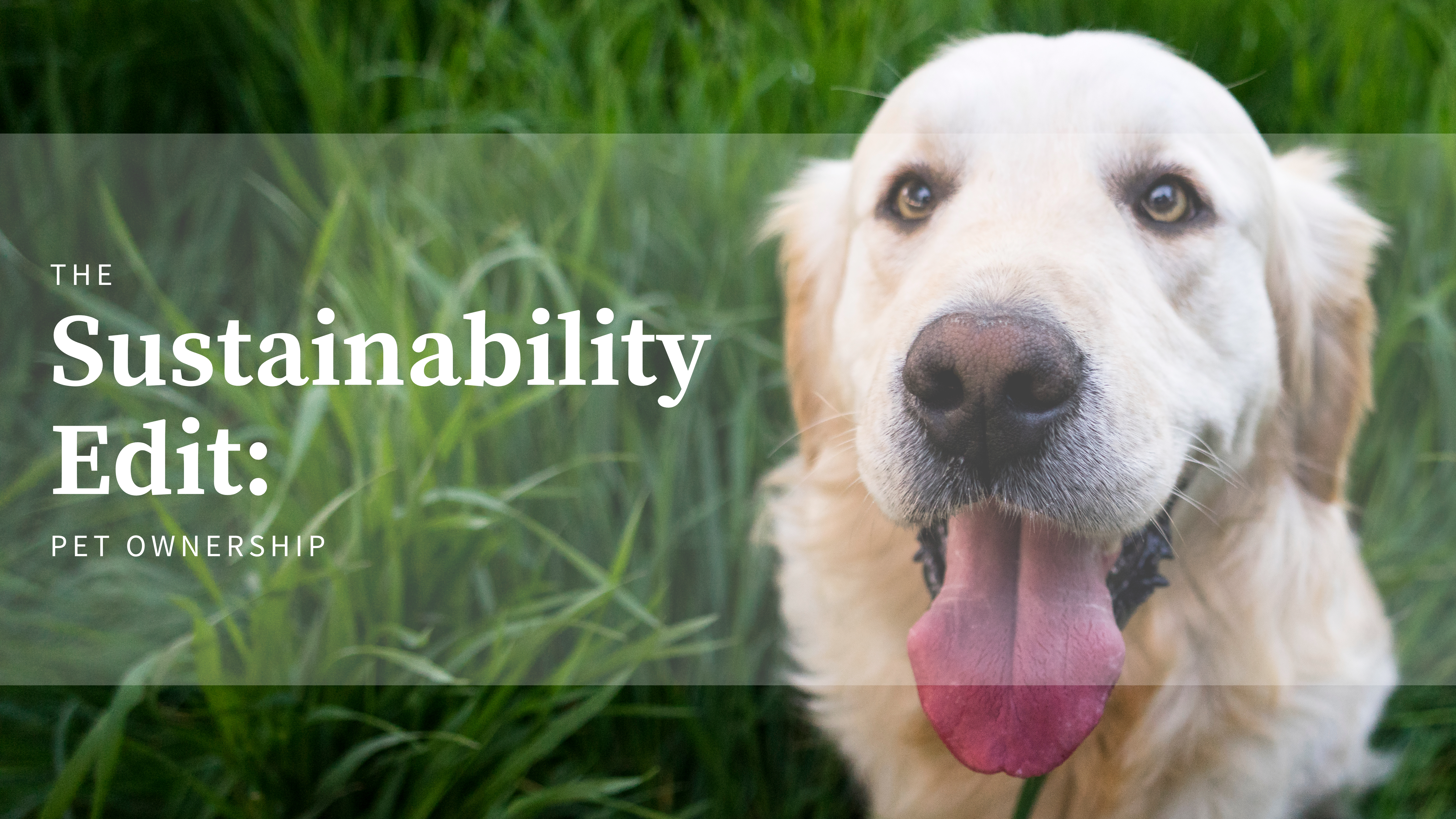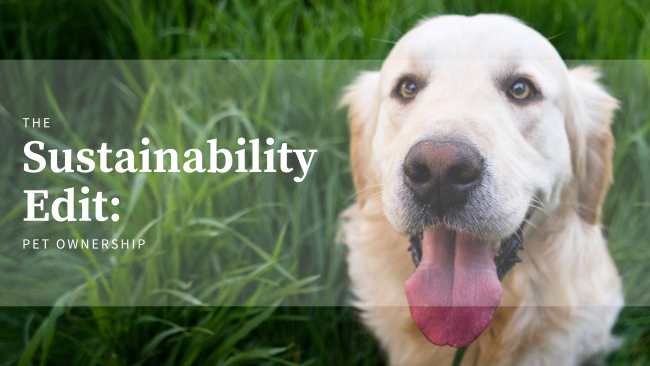
The Sustainability Edit: Pet Ownership

I can’t imagine life without my pets, I imagine you can’t either. As we are becoming increasingly more aware of our changing environment and conscious of the choices we make and their impact, our environmental footprints, it easy to overlook or forget the smaller footprints following along right beside us, or should I say paw-prints. Just like our environmental footprint, the decisions and choices we make for our pets have the potential to positively or negatively impact the environment.
Sustainability is defined as meeting the needs of the present without compromising the ability of future generations to meet their needs. Like all good pet owners, we want to ensure our pets needs are met and that their lives are full, healthy and happy, but as with our own maintenance and fulfilment, we must balance the needs of our furry companions and the needs of sustaining our environment.
Here are 5 sustainable edits you can make today for a more sustainable tomorrow for both and you and your pets:
1. Desex your pets
Things move quickly in the animal world, kittens can reproduce at 4 months old, puppies at 6 months old, and guinea pigs in just 28 days, if that’s not mind-boggling enough, here’s a real jaw-dropper: over a seven-year period, one female rabbit and her offspring can produce over 69 million babies! Without intervention, intact animals can reproduce at exponential rates which is ultimately and very sadly, unsustainable. Unwanted litters often end up in animal shelters, awaiting adoption or potential euthanasia, exhausting limited resources that could otherwise be used for other animals in need. It’s a sad, vicious cycle with an obvious solution.
2. Adopt, don’t shop
Death Row Pets estimates that 250,000 healthy yet unwanted dogs and cats are killed in Australian municipal pounds every year simply because rescue shelters and their limited resources sadly cannot accommodate them, which is why adoption is so important. There are so many wonderful, healthy, and deserving animals waiting for their second-chance, for every animal adopted, another rescue spot opens, adoption literally saves lives!
3. Buy in bulk
Buying in bulk has many great benefits for both you, your pets and the environment. Buying in bulk reduces both packaging waste (1x10kg bag of kibble vs 5x2kg bags of kibble) and the need for repetitive transportation and deliveries. The manufacture of packaging materials, specifically plastics, is extremely damaging to the environment as the production of plastic generates huge levels of CO2 that pollutes our atmosphere and warms our planet. Thankfully, there are now a growing number of pet stores that offer pet food refills that can be purchased by bringing along a reusable container, along with selling other refillable pet products such as pet shampoos and cleaning products, drastically reducing your pet’s waste over their lifetime.
4. Buy sustainable products
I’ve defiantly been guilty of over-indulging my pets with unsustainable products they absolutely do not need. I used to regularly drop $100+ at Kmart on completely unnecessary toys, accessories and costumes for my pets (which they absolutely hated). It’s something I’m still working on, resisting ‘fast pet products’ (a term I’m coining). Like shopping for our own clothing, fast fashion is desirable: super cheap and super convenient, as are fast pet products. The more visible and affordable the pet product, the more unsustainable (usually), cheaply made, disposable and not built to last (though it will last in landfill for a millennia). The good news is, like the rising anti-fast fashion movement we are seeing, businesses are listening to consumers and meeting the demand for sustainable alternatives, which includes sustainable alternatives to fast pet products. 2 easy and surprisingly affordable sustainable swaps I’ve made for my cat and dog, and highly recommend include:
- Purchasing sustainable kitty litter made from corn, grass, wood or tofu (yes, made from a by-product of the tofu making process), see: Biocat.
- Purchasing biodegradable and compostable dog poop bags, see: Oh Crap Dog Poop Bags.
* In Australia, there are approximately 4.2 million dogs that create over 1200 kilograms of waste PER DAY and that up to 4% of landfill is poop in plastic bags that will take over 1000 years to break down, gross.
5. Buy second-hand/donate
Sustainability is a journey and above are just a few of the sustainable alternative I’ve swapped into my sustainability edit. Almost all pet products have a sustainable alternative available now which is perfect for the conscious pet owner, but in the case of many still late to the party or unable to afford a ticket (remember: sustainability is a privilege), cheap unsustainable fast pet products may the only option. A way we can alleviate this fast-dependency is through donation and buying second-hand. Instead of throwing away lightly used collars, leashes, harness, beds, bowls or toys, donate them to a local animal rescue in need or give them away on Gumtree or Facebook, and inversely, before ordering or purchasing anything new (sustainable or not), look to see what second-hand bargain you can find and breathe new life into.
Emily Lynch
An up-and-coming communications professional about to graduate from UQ with a Bachelor of Comms, Emily is passionate about story telling, branding and visual communication that speaks (speak emoji)!
